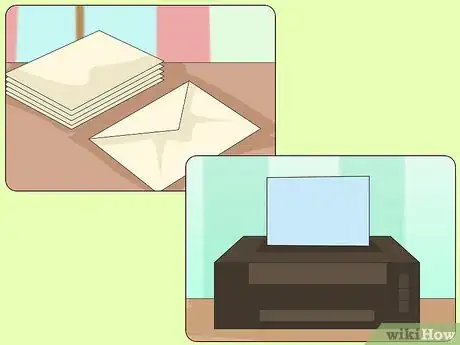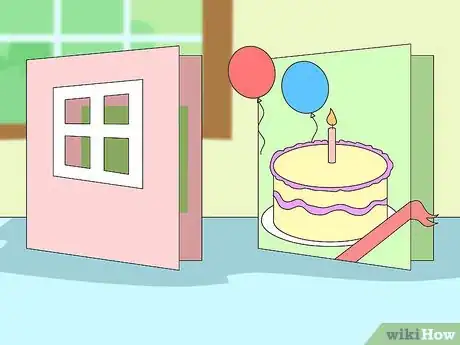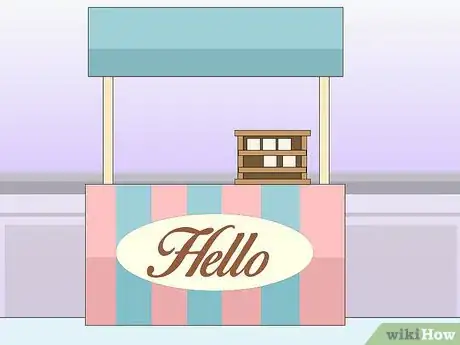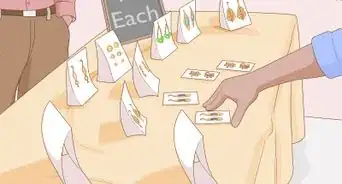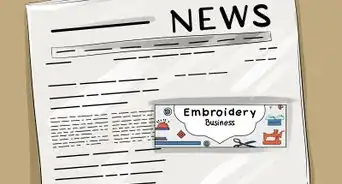wikiHow is a “wiki,” similar to Wikipedia, which means that many of our articles are co-written by multiple authors. To create this article, 18 people, some anonymous, worked to edit and improve it over time.
wikiHow marks an article as reader-approved once it receives enough positive feedback. This article received 12 testimonials and 89% of readers who voted found it helpful, earning it our reader-approved status.
This article has been viewed 160,370 times.
Learn more...
Creating and selling homemade greeting cards is a rewarding and fun way to make money at home. However, breaking into the business takes a lot of patience and time. Spend awhile establishing your product and considering your market before attempting to break into larger companies.
Steps
Starting Out
-
1Research the market. If you're looking to break into the greeting card business, you'll need to know a bit about the current market. Spend some time reviewing current trends on the market.
- Rhyming greeting cards were once fashionable, but in recent years the push has been towards funny cards or cards with brief, sincere statements. Rhyming words are usually reserved for funny or crude cards.[1]
- A positive aspect of the greeting card company is that it's a fairly steady business. Despite the presence of social media and the rise of e-cards, greeting cards remain a staple aspect of holidays and birthdays. The ability to sell your own greeting cards can provide you with a steady, longterm profession.
- Pay attention to the peaks in the market. Cards tend to sell more around holidays, but cards may also sell well during wedding seasons. Fall and summer weddings are common, so these seasons often result in increased sales.
-
2Decide on a brand. Your brand is the defining aspect of your company. How do you sell your product? Are your cards sweet, sincere, heartfelt? Or are you selling that are humorous, edgy, and at times crude? Having a solid, recognizable brand type can increase your likelihood of selling your cards.
- Understand the greeting card industry is incredibly competitive. Cards that are unique tend to sell better so don't be afraid to let your personality show through. Even if you feel your ideas are slightly unconventional, anything that sets you apart can help.[2]
- Settle on a target audience to help determine your brand. Are you planning on selling cards for the younger generation? Are you working on cards for children, teens, adults? Make sure you choose a target audience you have a personal connection with. If you're a 20-something with no interest in children, it's probably not a great idea to try and write children's birthday cards. However, you might do a great job of selling greeting cards to young adults.[3]
Advertisement -
3Compile a team, if necessary. Depending on how much experience you have with design and illustration, you may need to compile a team. If you have great idea, but aren't great at drawing consider reaching out to an illustrator. If you're artistically talented, but can't think of funny or interesting captions for your drawings try talking to a writer or cartoonist. Take some time to consider how big of a team you need and then gather some likeminded people.[4]
-
4Consider getting some education. Selling greeting cards requires more than creativity and artistic talent. You also have to know how to market yourself effectively. Consider taking a business or marketing course online or at a local college. This can help you gather the necessary skills you'll need to succeed.
Making Cards
-
1Get the necessary supplies. Once you've decided on a brand and compiled a team, make a small batch of cards. Aim to make around 50 to 100 and see how well they sell.
- The quality of your greeting cards can help them sell, so use the proper paper. Use premium paper stocks, like 16-point gloss cover or 13-point matte cover. You can find the proper paper at a local print shop.[5]
- Greeting cards can be printed in a variety of sizes. For the most part, however, they're 3.5-inch by 5-inch, 4.25-inch by 6-inch, or 5-inch by 7-inch. You'll also need big enough envelops to sell alongside the cards.[6]
- Keep in mind you'll probably need a special printer to print cards. You might not want to buy a printer yourself, as they can be expensive, but you can pay to use the right printer at a local print shop.[7]
- Stock up on supplies in your local craft store. Glitter, glue, and other items for decoration can help your greeting cards stand out.
-
2Decide on a card type. At the moment, cards that look meticulously crafted and unique are in, so put some extra effort into your cards. Learn about different types of greeting cards.
- Window cards are cards where the cover has sections removed so you can peak inside the card. It creates a window into a scene. These are fun, especially around the holidays. You can have Halloween, Christmas, or Thanksgiving themed window cards.
- Cards with scrapbook-like decorations are also in. These have a homemade feel to them that customers love. A scrapbook card is made with an assortment of decorations glued to nice paper. For example, for a birthday themed scrapbook card you could glue bits of wrapping paper, ribbon, and a stick of a birthday cake on the front of the card. Cut out the necessary letters of "Happy Birthday" from a local newspaper or a magazine.
- More elaborate decorations are also in at the moment. These include cards with pop ups inside, cards that can be folded into different shapes, and cards with slots to place money or gift cards. Use your imagination when creating your cards.
-
3Decide on written content. Are your cards going to be sweet and sincere? Or funny and sarcastic? Decide what written content to include, if any. Many people enjoy having inspirational or amusing quotes inside cards. This could help your cards sell but keep in mind you need to be careful when selecting quotations, especially if you're looking online. It's not unusual for quotes to be misattributed on sites like Quote Garden and Brainy Quote.[8]
-
4Seek outside help if necessary. If you're not crafty but have a great idea for a card, consult your team. Ask someone with more experience working with their hands to help you with a product. You can also take course at local community centers that go over the basics of things like scrapbooking, decorating, and drawing. This could help you gain the skills needed to make stand out greeting cards.[9]
Testing Your Product
-
1Ask if a local store will carry your cards and see how well they sell. You should test the cards out before you attempt to sell them to a big company. In fact, cards that have developed a small local following have a better likelihood of selling. Go to a local store that you're familiar with and see if the owner is willing to carry your cards for a short period of time. Tell the owner you're just interested in testing out your product to see how well they sell. If one owner says no, be persistent. Try several shops around town.
-
2Set up at a local craft shows. Another way to get your product some attention is to set up at local craft shows. Make a batch of cards for craft shows in the area and sign up to get a booth. Pay attention to how people respond to your cards. Try to get a sense of what you're doing right and wrong in regards to your greeting cards. If, for example, many people ask if you make cards using specific colors or for specific events, try incorporating these suggestions into the next batch of cards you make.
-
3Create a social media presence. Many companies got their start by fostering a strong social media presence. If you want to make and sell greeting cards, it's important you market yourself online.
- Create a Facebook page for your cards, with a fun and catchy name. Invite friends who you think would be interested. Ask them to spread the word.
- Share media on a regular basis. Always let your fans know when you've produced a new card and any updates on where customers can buy your cards.
-
4Research well known greeting card companies. Once you've established a small following, start researching greeting card companies. See how you can send in ideas and what guidelines they have for submissions.
- Contact various greeting card companies and see if they accept outside designs and new ideas. Many of the bigger companies, such as Hallmark, may want to stick to established providers but if you're diligent you may find a company looking for new ideas.
-
5Try selling your cards online. A great way to break into the market could be going through sites like Etsy. Selling your cards online can allow you to build a small following. It's also a fairly easy and low cost platform. Many people find it easier to break into selling cards online than in a physical location.
Selling Cards to Stores
-
1Provide your own fixture to sell your cards. It's hard to break into the greeting card business. However, there are small things you can do to increase your likelihood of getting your cards picked up. Offer to provide your own fixture to display your cards. You can buy inexpensive fixtures online or at furniture stores.[10]
-
2Follow submission guidelines for bigger companies. If you're submitting your portfolio to a bigger greeting card company, make sure you follow all their submission guidelines properly. As bigger companies get a lot of submissions, they look for excuses to ignore portfolios. Even a small mistake could get your product tossed aside.[11]
-
3Offer free shipping and avoid order minimums. Once again, offering perks to bigger companies can increase your likelihood of selling their products. Do not require order minimums for your cards. This will entice bigger companies as it lowers risk. Companies do not have to pay for more cards than they think they will reasonably sell. Free shipping minimizes the overall cost of purchase. Keep in mind as you become established, and there's more demand for your products, you'll be able to require minimums and charge for shipping. When starting out, however, it's a good idea to offer perks.[12]
-
4Keep trying. Rejection is typical in the greeting card business. It can take a very long time to get established. All you can do is take rejections with a grain of salt and keep trying. Try to keep a positive attitude and remind yourself setbacks and rejections are a key component of any success story.
Community Q&A
-
QuestionDo I need a business license to sell the cards?
 Community AnswerIf you sell them on places like Etsy, you won't need one. If you want to sell them on the street, check your city's vending rules.
Community AnswerIf you sell them on places like Etsy, you won't need one. If you want to sell them on the street, check your city's vending rules. -
QuestionCan I photography on cards?Sure - that's a great way to make greeting cards. However, make very sure that you own the copyright to any picture you use. If you use photographic materials that are copyrighted (as are many pictures you find online) and make and sell greeting cards, you will have to pay a substantial amount of royalties to the copyright owner.
-
QuestionHow can I put my drawing on cardboard?
 Community AnswerIf you just need a basic outline, trace the design with chalk or a 7B pencil, then press it on the cardboard. Sometimes, this works to transfer a simple outline.
Community AnswerIf you just need a basic outline, trace the design with chalk or a 7B pencil, then press it on the cardboard. Sometimes, this works to transfer a simple outline.
References
- ↑ http://www.writing-world.com/poetry/forbes.shtml
- ↑ https://www.psprint.com/resources/sell-your-greeting-cards/
- ↑ https://www.psprint.com/resources/sell-your-greeting-cards/
- ↑ https://www.psprint.com/resources/sell-your-greeting-cards/
- ↑ https://www.psprint.com/resources/sell-your-greeting-cards/
- ↑ https://www.psprint.com/resources/sell-your-greeting-cards/
- ↑ https://www.psprint.com/resources/sell-your-greeting-cards/
- ↑ http://www.making-greeting-cards.com/
- ↑ http://www.making-greeting-cards.com/




